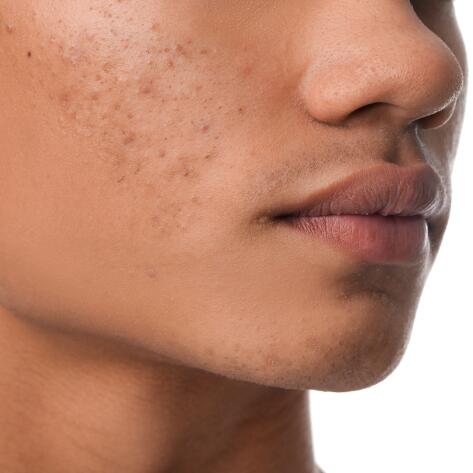-
Your concerns
Our articles to help you gain a better understanding
-
Our solutions
-
DUCRAY Dermatological Laboratories
For more than 90 years, Ducray Dermatological Laboratories have shown their commitment to improving the quality of life of people with skin and scalp conditions.
At Ducray, we take a global approach to disease management, to bring you truly useful and innovative skin and hair care routines treating everything from clinical symptoms to the psychological and physical consequences. And to target your needs even more effectively, we insist on involving both patients and dermatologists in our discussions.
This is why the products we develop are safe, effective, easy to apply and well tolerated to better manage dermatological disorders, including acne.
Acne is a very common inflammatory dermatosis. It is estimated that 9.4% of the world’s population suffers from it, which makes it the 8th most common dermatological condition.
L’acné generally develops in puberty and affects most teenagers worldwide. In France, it is one of the three most common disorders. In England and the United States, it affects nearly 80% of the population between the ages of 12 and 20 .
Contrary to popular belief, acne can also affect adults and infants. In adults, it mainly and increasingly concerns women (nearly 25%) and requires a specific clinical and therapeutic approach.
Acne is characterized by oily skin, large pores, blackheads, whiteheads and red spots. Lesions are located generally on the face, but can also appear on the back, shoulders and chest.
Acne severity is graded, from mild (grade 1) to very severe (grade 5). There can be many triggers, including pollution, the climate, diet, stress, lack of sleep and even medicinal treatments, such as the contraceptive pill. The sum of these environmental influences, and their effects on the reactions that take place inside our body (our internal environment), is called the exposome. The exposome has a direct impact on acne severity, acne duration and the risk of recurrence.
Acne is about much more than simply temporary, unattractive spots, it is a complex skin disorder that requires appropriate treatments and dermo-cosmetic care. Because it is an embarrassing rather than serious condition, and because it is very visible, acne can have a negative impact on quality of life and undermine self-confidence.
It is for all these reasons that our Ducray researchers study the disease in its entirety. We are constantly innovating to develop new cleansing products as well as targeted skin care proven clinically to be effective and which act on the different types of acne.
Tan JK, Bhate K. A global perspective on the epidemiology of acne. Br J Dermatol 2015 Jul;172 Suppl 1:3-12. doi: 10.1111/bjd.13462. PMID: 25597339.
Bhate K, Williams HC. Epidemiology of acne vulgaris. Br J Dermatol 2013;168(3):474-85.

Who better than you to explain your symptoms, sensations and observed improvements? Who better than you to inform us of your questions, the effects of acne on your morale and its consequences on your daily life?
There are lots of ways of better understanding people’s needs and feelings, including through focus groups, epidemiological surveys and conversations held with adolescents. Studies show that 88% of acne sufferers feel uncomfortable about the way others look at them , while 68% speak of the condition’s negative impact on their lives, because they feel more anxious in social situations .
In addition to social discomfort, our conversations with teenagers have revealed their physical discomfort: spots can be painful, itch and leave lasting and unattractive marks. Our discussions have also improved our understanding of your habits, which is how we came to develop a global routine that protects and purifies skin while also restoring comfort.
3Kern D. How common is adult acne?. 31/08/2022 https://www.acne.org/how-common-is-adult-acne
4Bhate K. (et. al.). Epidemiology of acne vulgaris. British Journal of Dermatology. 2013; 168(3); 474-85
5Hazarika N, Archana M. The Psychosocial Impact of Acne Vulgaris. Indian J Dermatol. 2016 Sep-Oct;61(5):515-20. doi: 10.4103/0019-5154.190102. PMID: 27688440; PMCID: PMC5029236.
6Hazarika N, Archana M. The Psychosocial Impact of Acne Vulgaris. Indian J Dermatol. 2016 Sep-Oct;61(5):515-20. doi: 10.4103/0019-5154.190102. PMID: 27688440; PMCID: PMC5029236.

And because we want to continue improving your acne treatment, it is only natural that we include you in our working groups, to contribute to and enrich our discussions. We can then tailor our products to meet the needs that you voice.
It is this close relationship that has helped us to understand your unique expectations and guided us when developing new products:
Involving you at every stage of product development is a powerful motivator, continually pushing us towards excellence and innovation. It is extremely useful to us and a source of inspiration for the researchers behind each of our Ducray Dermatological Laboratories acne developments.

Working in close collaboration with internationally renowned researchers and dermatologists has bolstered our thought processes, accelerated our research and expanded our expertise.
This approach has encouraged us to:
Furthering our knowledge
Our teams have been contributing to scientific research on acne since 1999. We have published our study results in leading journals, including the Journal of the European Academy of Dermatology and Venereology and the British Journal of Dermatology.
Advancing science
We have been leveraging the latest scientific advances in acne since 2012, through our partnership with Professor Brigitte Dreno, Professor of Dermatology and Chairperson of the Department of Dermato-Oncology at the University Hospital of Nantes. We use this new data and in-depth knowledge of the bacterium C. acnes at the origin of acne, including its characteristics and mechanisms, to guide our own research. And it was the recent fundamental discovery of the imbalance of this bacterium in acne patients that incited us to develop a combination of targeted active ingredients (Myrtacine® and Celastrol) that acts directly and in synergy on this feature, an action patented by our laboratories.
The collaboration in 2021 between our Pierre Fabre research teams and INSERM in Toulouse has expanded knowledge of C. acnes. They demonstrated the crucial effect of this bacterium on spot inflammation, which can be invisible to the naked eye.
This knowledge also serves to ensure the products we develop can be used both alone and combined with medicinal treatments.
New behaviors
Our contribution includes the organization of webinars for health professionals, to share solutions for helping people with acne-prone skin. Dr. Béatrice de Reviers, a general practitioner qualified in behavioral and cognitive therapies, contributes to these events. We are currently working with her on coping mechanisms, which consist in helping people affected by acne to cope with how others look at them, to limit the impact of acne on quality of life.
It was our discussions with health professionals and with people living daily with acne that spurred us to develop the KERACNYL skin care range for oily, acne-prone skin.
We selected targeted active ingredients for these formulas that act at all stages of spot formation:
Celastrol is a 100% natural-origin active ingredient found in the roots of Tripterygium wilfordii, a plant used widely in traditional Chinese medicine.
Our laboratories have developed a patented process to produce this active ingredient in large quantities in vitro, while using little energy and thus reducing our greenhouse gas emissions. A solution for your skin and our planet.
We formulate our skin care around our active ingredients. By combining these products, you get a complete routine that not only acts on the symptoms of acne but is also designed to soothe and stop the spot formation cycle. The range includes cleansing products, targeted care for different types of acne, and complementary products to purify the skin. These products are designed to be used either alone or combined with medicinal treatments.
KERACNYL products are both effective and innovative, which is why they have become a trusted and benchmark range among healthcare professionals.
KERACNYL PP+ Anti-blemish cream: The 2021 innovation award winner
The efficacy of KERACNYL PP+ is further boosted by the patented synergistic action of Myrtacine® and Celastrol, to promote the elimination of spots and residual marks.
*IQVIA - Xponent PharmaOne - Market for antiseborrheic treatments prescribed by doctors in pharmacies in France - 2021 - by value
** Clinical study conducted on 40 subjects. Twice daily application for 8 weeks.
*** Quantitative blind consumer test conducted on a panel of 68 women and men who used KERACNYL PP+ for 2 months.
**** Tolerance study in combination with topical treatments on 39 subjects aged 12 to 40 with mild to moderate acne. Study period (D1-D29); applied twice daily, morning and evening.
Symptoms, causes, types of spots... Check out our complet file to better understand your skin.
And see our tips on our information page to adopt the right everyday habits.
Like Albert Ducray, our teams have a single objective: to be truly useful to you.
To achieve this, we know we must work together, to make our research even more relevant and to create skin and hair products that really do improve your quality of life.
Our mission goes beyond this:
We make an active contribution to the scientific community:
By participating in all the international dermatological congresses and carrying out thorough pharmacological and clinical studies published in internationally renowned scientific journals, we are advancing acne research.
We will be continuing our involvement in scientific research through 2023. In March 2023, four new articles will be published in the Journal of the European Academy of Dermatology and Venereology, not only consolidating scientific data on the active ingredients used by our laboratories and the efficacy of the products in the KERACNYL range, but also furthering our understanding of the mechanisms and specific characteristics of the bacterium C. acnes at the origin of acne.
We are committed to developing the dermo-cosmetics of the future:
Through our involvement in the collective Conscious Care movement, we are taking action alongside other brands in the Pierre Fabre Group in favor of the environment, eco-design, naturalness, scientific progress and better living.
It is through all these actions that we help to improve the everyday lives of patients.
